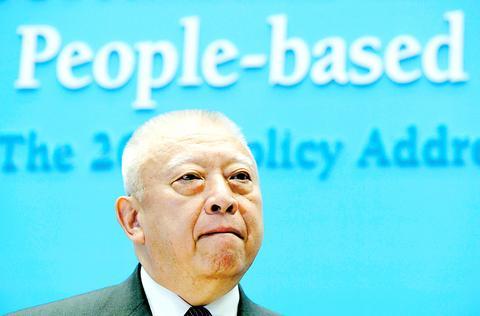Besieged by growing calls for more democracy and high unemployment, Hong Kong's deeply unpopular leader pledged yesterday to forge tighter economic links with China but ducked calls for faster political reforms.
Ignoring demands by pro-democracy activists to speed up changes, Chief Executive Tung Chee-hwa (董建華) said his government would have to consult Beijing first before addressing mounting demands for more voting rights.

PHOTO: REUTERS
Tung's comments were the clearest confirmation yet that he would not make a move on more democracy without getting explicit instructions from Beijing, and likely set the stage for more confrontations with an increasingly demanding population.
Democracy activists had warned they would stage more massive street protests if Tung didn't commit to faster reforms in his speech.
Hong Kong's constitution, the Basic Law, gives the city a high degree of autonomy under Chinese rule. But it also stipulates that Beijing has the final say over any major electoral changes in the former British colony it took back in 1997.
China's leaders are clearly worried that calls for more democracy in Hong Kong will spark similar demands in China.
Nearly 100,000 people marched to demand full democracy on New Year's Day in the biggest protest since half a million people took to the streets last July, shocking Tung and leaders in Beijing, who said they worried about the stability of the Asian financial powerhouse.
"I have decided to establish a task force ... to seriously examine these issues, particularly those concerning the understanding of the relevant provisions of the Basic Law and to consult relevant authorities of the central people's government," Tung said in his annual policy speech.
As he spoke to lawmakers, hundreds of people gathered outside the legislature shouting "Tung Chee-hwa resign" and demanding the right to elect their own leader and all of their legislators.
Tung, who was selected by China to run the city after the handover, devoted most of his speech to reminding Hong Kong people that their fortunes were becoming increasingly tied to China's.
He forecast that the city's gross domestic product would quadruple from US$1 trillion in 2000 to US$4 trillion by 2020 as the Chinese economy boomed.
Hong Kong has traditionally been a gateway for goods from China to the rest of the world, and a key entry point into China for foreign investors. Growing world demand for cheap Chinese goods helped pull Hong Kong's economy out of recession last year.
China's leaders hoped that political discontent would begin to evaporate as the economy improved but Tung has become so deeply unpopular that demands for more democracy have continued to grow.
He offered no major new initiatives to spur economic growth in his policy address but announced some temporary job creation measures.
"We expect to see sustained economic growth and a continued decline in unemployment this year," Tung said.
He also said the government's huge fiscal deficit remained a serious problem that needed to be resolved.
The government has forecast the deficit is on course to hit a record HK$78 billion (US$10 billion) in the fiscal year ending March.
Tung raised the possibility of new taxes and higher government fees but said the government did not want to endanger people's livelihoods.

DAREDEVIL: Honnold said it had always been a dream of his to climb Taipei 101, while a Netflix producer said the skyscraper was ‘a real icon of this country’ US climber Alex Honnold yesterday took on Taiwan’s tallest building, becoming the first person to scale Taipei 101 without a rope, harness or safety net. Hundreds of spectators gathered at the base of the 101-story skyscraper to watch Honnold, 40, embark on his daredevil feat, which was also broadcast live on Netflix. Dressed in a red T-shirt and yellow custom-made climbing shoes, Honnold swiftly moved up the southeast face of the glass and steel building. At one point, he stepped onto a platform midway up to wave down at fans and onlookers who were taking photos. People watching from inside

MAKING WAVES: China’s maritime militia could become a nontraditional threat in war, clogging up shipping lanes to prevent US or Japanese intervention, a report said About 1,900 Chinese ships flying flags of convenience and fishing vessels that participated in China’s military exercises around Taiwan last month and in January last year have been listed for monitoring, Coast Guard Administration (CGA) Deputy Director-General Hsieh Ching-chin (謝慶欽) said yesterday. Following amendments to the Commercial Port Act (商港法) and the Law of Ships (船舶法) last month, the CGA can designate possible berthing areas or deny ports of call for vessels suspected of loitering around areas where undersea cables can be accessed, Oceans Affairs Council Minister Kuan Bi-ling (管碧玲) said. The list of suspected ships, originally 300, had risen to about

A Vietnamese migrant worker yesterday won NT$12 million (US$379,627) on a Lunar New Year scratch card in Kaohsiung as part of Taiwan Lottery Co’s (台灣彩券) “NT$12 Million Grand Fortune” (1200萬大吉利) game. The man was the first top-prize winner of the new game launched on Jan. 6 to mark the Lunar New Year. Three Vietnamese migrant workers visited a Taiwan Lottery shop on Xinyue Street in Kaohsiung’s Gangshan District (崗山), a store representative said. The player bought multiple tickets and, after winning nothing, held the final lottery ticket in one hand and rubbed the store’s statue of the Maitreya Buddha’s belly with the other,

Japan’s strategic alliance with the US would collapse if Tokyo were to turn away from a conflict in Taiwan, Japanese Prime Minister Sanae Takaichi said yesterday, but distanced herself from previous comments that suggested a possible military response in such an event. Takaichi expressed her latest views on a nationally broadcast TV program late on Monday, where an opposition party leader criticized her for igniting tensions with China with the earlier remarks. Ties between Japan and China have sunk to the worst level in years after Takaichi said in November that a hypothetical Chinese attack on Taiwan could bring about a Japanese